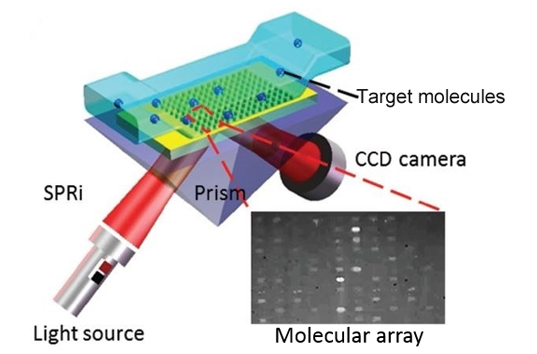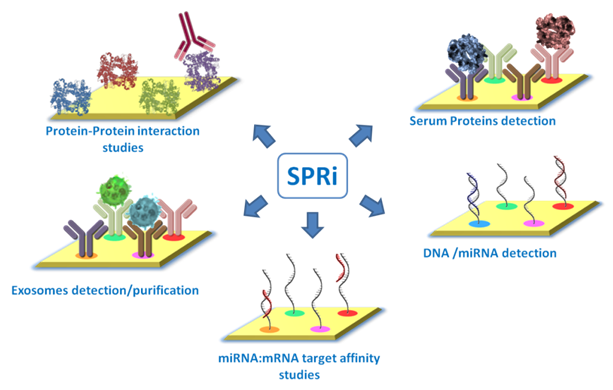Surface Plasmon Resonance Imaging (SPRi) Service
* Please kindly note that our products and services can only be used to support research purposes (Not for clinical use).
Online Inquiry
Surface Plasmon Resonance imaging (SPRi), namely surface plasmon resonance microscopy (SPRM), is a real-time, label-free, and high-throughput technique which is used to study biomolecular interactions based on detecting the refractive index changes resulting from molecular binding. More specifically, SPRi has been developed to examine affinity between biomolecules, screen biomarkers and detect biopsy specimens.

Basic principles
Surface Plasmon Resonance (SPR) is an optical detection process that occurs when a polarized light hits a prism covered by a thin planar metal (typically gold or silver) layer. At certain angles of incidence, a portion of the light energy couples through the gold coating and creates a surface plasmon wave at the sample and gold surface interface. The angle of incident light required to sustain the surface plasmon wave is very sensitive to changes in refractive index at the surface (due to mass change), and it is these changes that are used to monitor the association and dissociation of biomolecules.
Applications
Kinetic characterization by Surface Plasmon Resonance and other methods has already been an important step for drug researchers to select and characterize novel therapeutics as well as for basic life scientists to investigate specific biological binding events. When combined with appropriate surface chemistry, microfluidics and software, SPRi is unmatched in its range of applications including:

- Affinity analysis
- Kinetic analysis
- Ligand-fishing
- Epitope mapping
- Protein / protein interaction
- DNA/DNA interactions
- Protein/carbohydrates
- Protein / DNA interactions
- RNA/RNA interactions
- Antibody (protein) / bacteria interactions
- Antibody / cell interactions
- Peptide / protein interactions
- Polymer / polymer interactions
Our Services
In conclusion, SPRi is a well-established leading technology for measuring binding association (ka) and dissociation rates (kd), affinities (KD). Creative Peptides offers SPRi (Surface Plasmon Resonance imaging) services including Biochip design and printing, Bio-interactions analysis (binding affinity and kinetic processes detection), Summary and analysis of the results. Typical SPRi services include:
As for our clients, all you need to do is just tell us the essential details of the experiment, and then our scientists will provide a comprehensive solution to match their scenario. At the end of the service they will get the result of the SPRi and the full experiment data.
References
- Guner, H., Ozgur, E., Kokturk, G., Celik, M., Esen, E., Topal, A. E & Dana, A. (2017). A smartphone based surface plasmon resonance imaging (SPRi) platform for on-site biodetection. Sensors and Actuators B: Chemical, 239, 571-577.
- Zhang, F., Wang, S., Yin, L., Yang, Y., Guan, Y., Wang, W & Tao, N. (2015). Quantification of epidermal growth factor receptor expression level and binding kinetics on cell surfaces by surface plasmon resonance imaging. Analytical chemistry, 87(19), 9960-9965.












